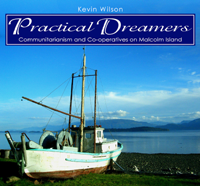
- Practical Dreamers: Communitarianism and Co-operatives on Malcolm Island
- B.C. Institute for Co-operative Studies (2007)
Few British Columbians know about Malcolm Island. It sits off northern Vancouver Island, a 20-minute ferry ride from Port McNeill. The population of the island is currently between 750 and 800, and has rarely been over 1000. It has always attracted minorities: left-wing Finns, American draft dodgers, even Vietnamese salal harvesters.
The island has few resources. Logging and fishing bring in far less money than they used to. Young families can't find work.
Despite all this, maybe because of all this, Malcolm Island deserves our attention. Its one town, Sointula, has made history for over a century. Founded in 1901 as a utopian colony of Finnish émigrés, it has changed repeatedly while remaining stubbornly itself: a community of cooperative individualists.
In 2005, Kevin Wilson published Practical Dreamers: Communitarianism and Co-operatives on Malcolm Island. Few books have examined a B.C. community in such detail.
Wilson describes how Finnish workers became fed up with the brutality and exploitation of James Dunsmuir's Nanaimo coal mines. They trusted neither capitalism nor government, and dreamed of socialism on a small scale. To make the dream reality, they founded Sointula, "place of harmony," on the south shore of Malcolm Island.
The implosion of Utopia
Their utopian colony imploded in just four years. But many of the settlers remained on the island as individual homesteaders, while scattering across the coast in search of seasonal work.
Conditions on fishing boats and in logging camps weren't much better than in Dunsmuir's mines. The Finns worked to organize co-ops and unions. The Sointula Co-op Store, founded in 1909, is still running. A fisherman's co-op, intended to break the grip of the big canneries, failed because banks wouldn't lend it money. A credit union now stands next to the Co-op Store.
Isolated as they might be, Sointulans were still very aware of politics elsewhere -- especially after the Russian Revolution. Sointula's residents joined the Finnish Organization, an émigré society closely allied to the Communist Party of Canada. While other B.C. towns supported Girl Guides and Boy Scouts, in Sointula, kids wore the red neckerchiefs of the Young Pioneers, and paraded behind a hammer-and-sickle flag.
Do-it-yourself communitarians
More than previous historians, Wilson evokes Sointulans' remarkable mix of attitudes: they were rugged individualists with a do-it-yourself communitarian approach to problems.
Wilson shows how Sointula adapted again and again to changing conditions. When their fishing co-op failed, they joined the United Fishermen and Allied Workers Union, and waged a successful strike.
When right-wing Finns arrived after the Finnish-Soviet Winter War of 1939-40, the left-wingers argued with them -- but eventually everyone got along. (The RCMP suspected Sointulans first of being pro-communist, then of being pro-Nazi, but couldn't infiltrate the tight-knit community to acquire evidence.)
Keenly aware of the power of banks, Sointulans started their own credit union --but were so self-reliant they rarely took out loans. They got along without electricity and phones until the 1950s. They entertained themselves with their own plays, written and performed by islanders -- in a community hall where "Workers of the World, Unite!" was inscribed over the stage.
In the 1960s, American draft dodgers arrived and eventually won acceptance when they showed they were serious about farming. They also went into logging and fishing. The newcomers went on to found a co-op tree-planting business largely managed and staffed by women.
In the early 1970s, the Sointula Women's Auxiliary of the UFAWU transformed itself into the Recreation Board, which ran swimming programs as well as volleyball, basketball, and other activities for kids. The Rec Board went on to raise $300,000 to build a baseball field.
This do-it-yourself attitude has persisted despite occasional setbacks. A co-op food-processing plant, first proposed in 2000, somehow became a seasonal restaurant, the Wild Island Café and Bakery. After the Mifflin Plan made commercial fishing too expensive for many, the Malcolm Island Shellfish Co-op offered the hope of a commercial abalone operation. It was recently dissolved.
Maintaining a sense of community
As Sointula moves into its second century, it's struggling to maintain its sense of community. The elementary school, built for 100 kids, enrolls only about 30. Housing is increasingly expensive, and many newcomers are wealthy Americans: they buy waterfront homes, sight unseen, for steep prices, and then use them only as summer getaways. They're not really committed to Sointula. Tourism is no substitute for the logging and fishing that once sustained the island.
Nevertheless, little Sointula has big implications for other communities all over B.C. and Canada. Hundreds of towns and cities are trying to cope with the decline of high-pay manufacturing and extraction industries, and the rise of dead-end McJobs that young people rightly scorn. Sointula's successes and failures are instructive for us all -- especially in their demonstration that stubborn individualists can work together to solve their problems.
Kevin Wilson's book, then, isn't just for a few nostalgic Central Coast old-timers, but for anyone interested in the future of B.C.'s communities. It's available online from the publisher, the B.C. Institute for Co-operative Studies, at the University of Victoria . Don't let the many typos and editing errors put you off -- the history and case studies offer a wealth of ideas.




